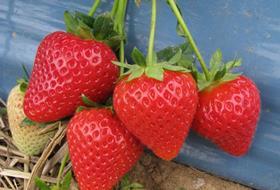
Soft fruit growers have come to the end of a ‘peaky’ and difficult season, as a late start meant that the UK crop peaked in mid June with a glut of fruit.
During the week beginning 24 June, coinciding with Wimbledon, there was 50 per cent more fruit on sale compared to the same time last year. Berryworld procurement director Dave Ashton says the effect was a combination of low returns from supermarkets, more fruit going to wholesale and some not even being picked.
“Production went from nothing to lots in about ten days, with no chance of catching up,” he explains. “From a grower’s perspective it hasn’t been a good season. Yields of most things were down and pricing has been depressed.”
Discussing trends within specific berry crops, Ashton notes that customers are being more selective over varieties. He says industry varieties of strawberry, such as Capris or Triumph, are no longer on the customer preference list. He suggests other varieties are deemed better than industry standard by consumers, despite smaller yields resulting in higher costs.
He stresses that although across the board berry yields were down, in one case this didn’t cause problems: blackberries didn’t perform, he says, but returns were up so low production was countered.
British Summer Fruits chair Lawrence Olins says that the late start and Spring weather conditions meant growers experienced a “concertina effect”, which affected overall sales.
“Sales of berries continued to peak until mid-August, and then the continuous hot weather meant our yields decreased rapidly, due to high temperatures and plants producing fewer flowers than normal. The result was a very rapid end to the season affecting ever-bearer strawberries in particular.”
Olins adds that raspberries suffered similar issues to strawberries, while blueberries were relatively unaffected by the weather.
He also notes that the SWD fruit fly is one issue facing the sector. Olins stresses that good hygiene and control treatments have so far been successful in controlling the pest, which although not harmful to health or fruit quality, damages the crop’s aesthetic value.
Phil Acock, managing director of processing company Fourayes, says sending soft fruit for processing could be one way to see returns if a crop has been affected by SWD.
Fourayes already collects soft fruit from several growers in the Kent region that haven’t made supermarket first class, to make into purees for jam, and Acock says the company would like to take more.
“Processing can be a big cost saving for growers as they can send fruit which wouldn’t make the grade to sell fresh. It may well be a good outlet for fruit affected by SWD.”
He says processing also helps tackle the waste problem, adding that partnerships, such as linking up to a processing firm, could be very important for the future.
Going forward, the soft fruit sector is looking to counter relatively static prices with productivity gains.
Grower Marion Regan, of Hugh Lowe Farms in Kent, thinks the way to do this is through technical expertise. “The soft fruit sector is growing in interesting directions and we are always looking for research developments. We need to be producing more at the shoulder of the seasons and produce more fit-for-purpose fruit.
“It’s not been a vintage year but we are pleased to be sitting here at the end of November and being ahead of work.”



